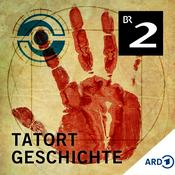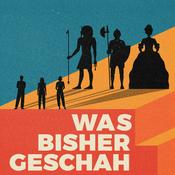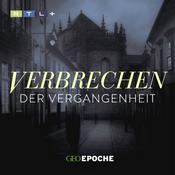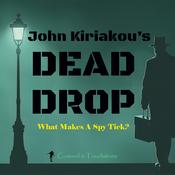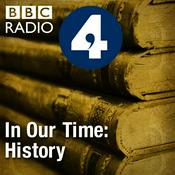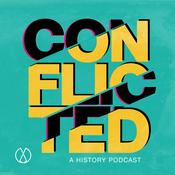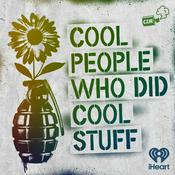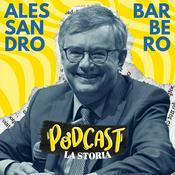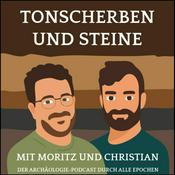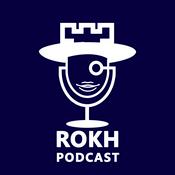1052 Episoden
Gears, Gold, and Global Peace: A Steampunk Bitcoin Journey Through an Alternate 20th Century
20.1.2026 | 1 Std. 5 Min.We have paper money today because it functioned as an IOU, certifying that the holder could redeem it for an equivalent amount of physical gold or silver from the bank's vault. That’s where the English pound got its name as it matched a specific weight of gold (or silver). This was the gold standard, and this is how banks operated for centuries. But it was largely abandoned after World War I, when governments prevented the withdrawal of gold by suspending the convertibility of their paper money into gold to conserve national gold reserves for purchasing vital war supplies and to allow central banks to print money for financing massive military expenditures. Governments abandoned linking their money to anything at all, giving central banks full control over the money supply. Printing money has led to inflation, national debt, and financial instability, which ultimately fueled the creation of cryptocurrency like Bitcoin as a decentralized, mathematically-scarce alternative.
What if things hadn’t happened this way? What if the gold standard survived the Great War? Today’s guest, Saifedean Ammous , imagines this scenario in his new book The Gold Standard: An Alternate Economic History of the 20th Century.” The story begins with a fictional divergence in 1911: French aviation pioneer Louis Blériot partners with the Wright brothers to create the Blériot Transport Corporation (BTC), an airplane-based, peer-to-peer gold-settlement network. This innovative system quickly becomes a secure alternative to central banks. When World War I starts, the BTC offers Europeans a way to export their wealth to neutral countries, escaping central bank war inflation. This triggers a global financial panic in September 1915, bankrupting the world's central banks, abruptly ending the war, and strangling fiat money in its cradle. With the collapse of central banking and the establishment of a free-market, decentralized gold standard, a radically different 20th century unfolds. Hard-money savings become plentiful and cheap, accelerating technological progress, increasing energy production, and fostering a world of appreciating money and declining prices.
Without the ability to print money to fund expansive projects, governments become more accountable, transforming into mere service providers whose citizens expect better service at a lower cost. This thought-provoking narrative suggests that the absence of central bank financing could have prevented major 20th-century conflicts, eliminated chronic inflation, and ushered in a "Century of Affluence" based on lower time preference, long-term investment, and voluntary governance.
See omnystudio.com/listener for privacy information.- Nearly a century of Cold War tensions between the United States and Russia hide the incredibly close friendship that the two nations enjoyed before this period. From America’s colonial founding in the 1600s to the eve of World War One, the two distant nations relied on each other in a surprising number of ways. Each country was searching for allies on the world stage, and this culminated in a "blueprint for friendship" during the 1860s and 1870s, spurred by mutual conversations around the abolition of slavery and serfdom. However, this amicable distance dissolved following the Russo-Japanese War, which introduced cycles of mutual stereotyping and a damaging "war of images," where Americans saw Russian authoritarianism and Russians saw US imperialism and racism. Despite these emerging tensions, the relationship continued its characteristic oscillation, with both countries drawing inspiration from one another, leading to a brief "wartime honeymoon" at the start of World War I.
To discuss this forgotten chapter in Russian-American history is today’s guest, Victoria Zhuravleva, one of the authors of “Distant Friends and Intimate Enemies: A History of American-Russian Relations.”
See omnystudio.com/listener for privacy information. - One of the worst nautical disasters in recent American history is the sinking of the SS Edmund Fitzgerald. On November 10, 1975, the “storm of the century” threw 100 mile-per-hour winds and 50-foot waves on Lake Superior. The ship found itself at the worst possible place, at the worst possible time. When she sank, she took all 29 men onboard down with her, leaving the tragedy shrouded in mystery for a half century.
The sinking of the SS Edmund Fitzgerald is so strange because the ship was exceptionally large and strong, and would normally be able to shrug off storms like this. At 75 feet wide and 729 feet long, the Fitzgerald was at the time of her launch the largest ship on the lakes, and she repeatedly broke her own records for the largest loads, the fastest runs, and the biggest season hauls throughout her career. She was a champion heavyweight, sprinter, and workhorse, all in one.
To make the sinking stranger, she suddenly disappeared in a bad storm on Lake Superior without sending any distress calls despite having a massive modern radio system. The most widely accepted theories for the disaster include the ship hitting a shoal, suffering a structural failure like a broken back, or being overwhelmed by massive "three sisters" rogue waves.
However, some less common and conspiracy-like theories suggest the crew did not properly close the hatch covers, the ship was actually split by a UFO, or that it was the victim of a secret Coast Guard experiment gone wrong.
Todays’ guest is John Bacon, author of “The Gales of November: The Untold Story of the Edmund Fitzgerald.” We explore the vital role Great Lakes shipping played in America’s economic boom, the uncommon lives the sailors led, the sinking’s most likely causes, and the aftermath for those left behind.
See omnystudio.com/listener for privacy information. Inside the Deadly German U-Boats That Brought Britain to Its Knees (But Were Deadlier for Their Own Crews)
08.1.2026 | 41 Min.Over the course of World War II, Germany’s submariners sank over three thousand Allied ships, nearly three-quarters of Allied shipping losses in all theaters of the war. Winston Churchill famously declared the only thing that truly frightened him during World War II was the U-boat threat. But the treat was more imagined than real. The actual capability of the German Navy was somewhat limited. Some historians think that the Germans would have been better off in WWII if they had built no navy at all and devoted those resources to the army and the Luftwaffe. In the process the submariners endured horrific conditions and suffered a 75 percent death rate, the highest of any arm of service in the conflict.
The campaign began with daring, high-profile successes that fostered a dangerous overconfidence, most notably the sinking of the HMS Royal Oak in 1939 by U-47, which killed 835 British crewmen. Yet, despite these early victories—when the U-boat wolfpacks inflicted devastating losses on weakly defended Allied convoys—the force was never able to maintain the scale needed for a knock-out blow. By the time Germany had sufficient numbers, the industrial and military might of the United States, coupled with increasingly effective Allied countermeasures, had already passed the U-boat's moment of maximum threat. As the war progressed, the elite, superbly trained pre-war crews were wiped out and replaced by those with less training, leading to a steady deterioration in effectiveness.
Today’s guest is Roger Moorhouse, author of “Wolfpack: Inside Hitler’s U-Boat War.” We look at how Germany’s U-boat campaign challenged British naval supremacy and brought international trade to its knees. We follow the story of these U-Boat crews from the enthusiasm of the war’s early days, buoyed with optimism about their cause, through the challenges of the Allied counterthreat, to the final horrors of enemy capture and death in the depths.
See omnystudio.com/listener for privacy information.Manifest Destiny, Powered by Coal: How “Black Gold” Conquered the American Continent
06.1.2026 | 49 Min.America’s growth from a rugged frontier nation to the globe’s industrial superpower in the space of 100 years can be explained by one word: coal. Before coal dominance, American buildings were defined by height limits imposed by stonework. The tallest building in the 1830s was Baltimore’s 235-foot tall Phoenix Shot Tower. Transportation also worked poorly without coal. The early wood-fired 4-4-0 locomotives struggled with top freight speeds around 15 mph and pulling trains of approximately 450 tons. The transition to coal and cheap steel enabled the steel-supported 555-foot Washington Monument and allowed massive coal-fired trains to achieve express passenger speeds up to 100+ mph and haul loads over 4,000 tons.
For a century the entire world was dependent on coal. It powered railroads, built urban skylines, and provided warmth, light, and power for families rich and poor. Although the American economy soared, society unknowingly suffered from coal’s debilitating health and environmental impacts. Skies were so dirty that on some days, visibility was limited to a few feet. Coal miners frequently died from cave-ins, explosions, or contracting black lung. Towns like Centralia in Illinois were fundamentally destroyed by an underground fire started in 1962 that continues to burn.
Today’s guest is Bob Wyss, author of “Black Gold: The Rise, Reign, and Fall of American Coal.” We look at a range of figures that were part of coal’s story, from a largely unknown and unrecognized Pennsylvanian inventor who helped spark the Industrial Revolution to a prominent society clubwoman who clashed with the powerful coal forces in Utah that were fouling the air and sickening residents. It also includes clashes between powerful tycoons, coal miners, and the American public.
See omnystudio.com/listener for privacy information.
Weitere Geschichte Podcasts
Trending Geschichte Podcasts
Über History Unplugged Podcast
For history lovers who listen to podcasts, History Unplugged is the most comprehensive show of its kind. It's the only show that dedicates episodes to both interviewing experts and answering questions from its audience. First, it features a call-in show where you can ask our resident historian (Scott Rank, PhD) absolutely anything (What was it like to be a Turkish sultan with four wives and twelve concubines? If you were sent back in time, how would you kill Hitler?). Second, it features long-form interviews with best-selling authors who have written about everything. Topics include gruff World War II generals who flew with airmen on bombing raids, a war horse who gained the rank of sergeant, and presidents who gave their best speeches while drunk.
Podcast-WebsiteHöre History Unplugged Podcast, Tatort Geschichte - True Crime meets History und viele andere Podcasts aus aller Welt mit der radio.de-App
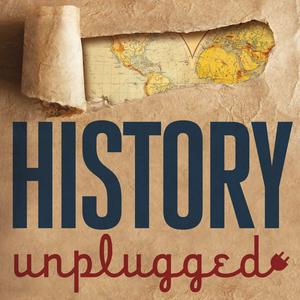
Hol dir die kostenlose radio.de App
- Sender und Podcasts favorisieren
- Streamen via Wifi oder Bluetooth
- Unterstützt Carplay & Android Auto
- viele weitere App Funktionen
Hol dir die kostenlose radio.de App
- Sender und Podcasts favorisieren
- Streamen via Wifi oder Bluetooth
- Unterstützt Carplay & Android Auto
- viele weitere App Funktionen


History Unplugged Podcast
Code scannen,
App laden,
loshören.
App laden,
loshören.

